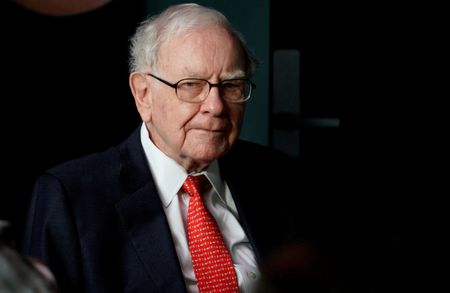 1
1 1
1

By Jonathan Stempel
(Reuters) – Warren Buffett’s Berkshire Hathaway Inc on Saturday reported its highest-ever annual operating profit, even as foreign currency losses and rising interest rates contributed to lower earnings in the fourth quarter.
Buffett called 2022 a “good year” for Berkshire in his annual shareholder letter, after the conglomerate’s dozens of businesses generated $30.8 billion of profit despite rising inflation and supply chain disruptions, including from the war in Ukraine.
Berkshire also bulked up its cash hoard, ending the year with $128.6 billion after selling about $16.3 billion of stocks in the fourth quarter.
The Omaha, Nebraska-based company found more value buying back its own shares, repurchasing $2.6 billion, and bought back about $700 million more in the first month-and-a-half of 2023.
Though its stock price is down 1.5% this year, lagging the 3.4% gain in the Standard & Poor’s 500, Berkshire shares outpaced the index by 22 percentage points in 2022, reflecting their status as a defensive investment in rocky markets.
Berkshire shareholders “trust us to treat their money as we do our own,” Buffett said in his letter. “And that is a promise we can make.”
Quarterly operating profit fell 8% to $6.71 billion, or $4,596 per Class A share, from $7.29 billion.
Net income for the quarter fell 54% to $18.16 billion, or $12,412 per Class A share, from $39.65 billion a year earlier.
Buffett considers net results misleading because they include gains and losses on investments that Berkshire hasn’t sold.
GEICO STRUGGLES PERSIST
Operating results included about $1.2 billion of currency losses and a sixth straight underwriting loss at the car insurer Geico, which has boosted premiums after struggling with accident claims and properly pricing policies to reflect risk.
Berkshire projected that Geico, which shed 7% of its 41,000-person workforce last year, will generate an underwriting profit in 2023.
Results also reflected a 24% jump in profit from energy and utility operations, as well as Berkshire’s share of Occidental Petroleum Corp’s earnings after it built a 21.4% stake in the oil company.
Berkshire also owns 20.4% of American Express Co, which its financial results do not incorporate.
Though rising rates helped Berkshire generate more income from insurance investments, they also hurt its Clayton Homes unit and namesake real estate brokerage by cutting into demand for housing construction, purchases and refinancings.
In addition, profit at the BNSF railroad fell 13% as the Federal Reserve’s rate-hike campaign began slowing the nation’s economy, and shipping volumes of consumer, industrial and agricultural products as well as coal all declined.
“Interest rates were the primary driver in somewhat soft fourth-quarter results” in an otherwise “pretty strong year” for Berkshire, Jim Shanahan, an Edward Jones & Co analyst with a “buy” rating on Berkshire.
For all of 2022, Berkshire posted a net loss of $22.82 billion, though that largely reflected declines in its $308.8 billion portfolio of common stocks, led by Apple Inc.
MORE FLOAT
Berkshire did spend $11.5 billion in the fourth quarter to buy the insurance company Alleghany Corp.
That purchase helped boost insurance “float,” which reflects premiums collected up front before claims are paid and help fund growth, 12% last year to $164.1 billion.
“Buffett takes those insurance premiums and buys good quality businesses,” said Bill Smead, a longtime Berkshire investor at Smead Capital Management in Phoenix, which invests $5.5 billion.
Thomas Russo, whose Gardner Russo & Quinn in Lancaster, Pennsylvania invests $8 billion, about 17% of which is in Berkshire, added: “Buffett often describes float as more important than cash.”
Berkshire also spent $8.2 billion on Jan. 31 to boost its stake in truck stop operator Pilot Travel Centers to 80% from 38.6%.
Cathy Seifert, a CFRA Research analyst who rates Berkshire “hold,” said Geico remains a “big pain point” because of elevated accident losses, and called on it to disclose “more about what it’s doing to rectify a chronic situation.”
(Reporting by Jonathan Stempel in New York; Editing by Mark Potter and Diane Craft)